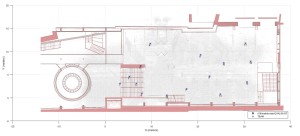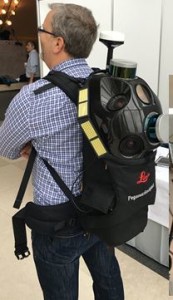Leica Geosystems sponsors Indoor Localisation Competition

As part of the 15th International Conference on Information Processing in Sensor Networks (IPSN), Leica Geosystems partnered with Microsoft and Google to host an Indoor Localisation Competition 10-11 April.
Accurate indoor localisation has the potential to transform the way people navigate indoors in a similar way that GPS transformed the way people navigate outdoors.
When 31 teams descended on Vienna, Austria earlier this month, they set out to prove this potential. Armed with laser scanners, GNSS receivers, total stations and other measurement instruments, the teams set to work to prove this potential.
“We’ve held the indoor localistation competition since 2014 to bring teams working in this area together in a more effective way to further this exciting technology,” siad Dimitrios Lymberopoulos, an organiser of the event with Microsoft Research.
Competing for recognition, advancement
The competition was divided into two sections:
1. 2D Category
Participants were required to report X and Y coordinates of 15 pre-measured internal locations. No hardware was required as WiFi and IMU-based applications were used. Teams had three pre-defined WiFi access points to work with.
2. 3D Category
Participants were required to report X, Y and Z coordinates of 15 pre-measured internal locations. Custom hardware was used, including UWB and Ultrasound. Each team was allowed to use five anchor devices in the evaluation space
Each team was judged on its average localisation error across the 15 test points. The lower the error, the higher the team ranked.
“We had a great competition this year with teams showing innovative methods for indoor localisation,” said Lymberopoulos.
Delivering the best results with the Leica Pegasus:Backpack
Though not eligible for the final awards as a sponsor, the Leica Pegasus:Backpack did compete in the 3D Category. Worn by Kris Morin, Leica Geosystems M3D Inertial Fusion manager, the Backpack reported the XYZ coordinates with an average localisation error of .053, the lowest in the category.
“We arrived on site without any pre-mapping, determined our location and built a very accurate map of the site,” said Morin. “As the only one of its kind in the competition, the Pegasus:Backpack ranked No. 1 and continues to prove to be a highly-precise and well-designed solution.”
Final results of the competition can be viewed here.


























